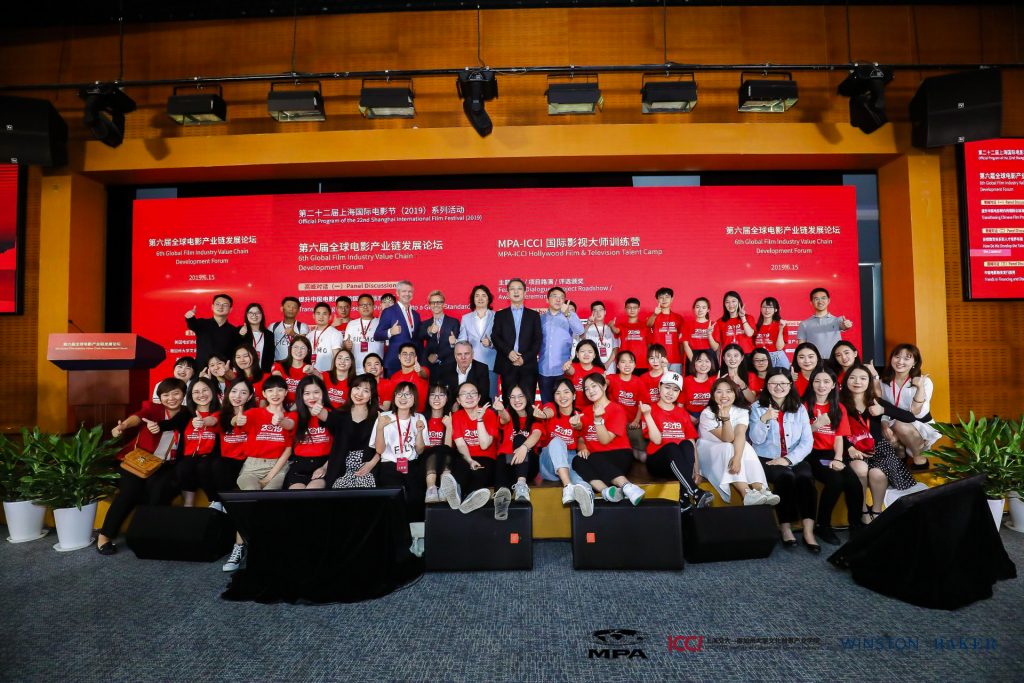Greater professionalism across the board key to China’s unique and fast evolving film industry.
Returning to Shanghai for its 6th iteration, the Global Film Industry Value Chain Development sought answers as to how the Chinese film industry could find long term growth and sustainability.
Organized the Motion Picture Association, Shanghai Jiao Tong University and Winston Baker, and held on the eve of the Shanghai International Film Festival, the day-long think-tank confronted the bigger questions around the continuing development of the Chinese film industry.
The event concluded that greater professionalism in all areas of the Chinese film industry could lead to better quality production, a more sustainable, long-term business, and a greater likelihood of international success.

Guests from the U.S. Europe and China swapped theories on ways to improve development, production and how best to work with international markets.
Takeaway highlights include:
- Perfect Village Asia CEO Ellen Eliasoph, on China’s unique characteristics: “The Hollywood studio system is an obsolete model for China… China is fast-moving, and is digitized.”
- Chen Xugang, an academic from Beijing University: “We can be #1 in terms of volume, but we need to professionalize and accelerate the process of industrialization. We need to be humble and ready to learn.”
- Bona Film Group’s SVP Jiang Defu, said: “In the West, filmmaking tasks are clearly defined. But Chinese studios are all over the place, everyone is multi-tasking… We need to specialize and focus on own strengths.”
- Familiar industry figure, Jerry Ye, Huayi Brothers Pictures CEO and media group VP said: “We are building a different ecosystem, based on multi-screen integration. (Film producers…) have good relations with streaming platforms. The speed of development brought us together.” Ye was keen to echo Eliasoph’s distinction that the Chinese film industry grows and evolves far more quickly that the U.S.
- Miao Xiaotian, president of China Film Co-production Corporation (CFCC), who has experienced many ups and downs in China’s co-production history, said: “We’ve witnessed a surge in co-productions (between China) and the U.S. and with Europe. The box office (in China) for American films has been strong, that’s why U.S. productions are coming to China… But success stories among co-productions are not that common. That’s down to cultural differences, and lack of knowledge of each other’s markets. Most of the co-productions that have succeeded are Chinese stories, and they have not done well overseas.”
- Bennett Pozil EVP of film financing company EastWest Bank, anticipated that: “In the next 12-18 months there will be a Chinese movie that has global pull. Chinese films are going to find their voice internationally,” adding context that the number of studios in the U.S. was shrinking, and streaming was on the rise exponentially… Disruption in the U.S. is good for Chinese films. P&A (print and advertising costs) are used as a barrier to entry to the U.S. market — $40 million is needed just to get you to the table,” said Pozil, proposing that streaming companies could share Chinese films – think The Wandering Earth – with audiences around the world at minimal advertising cost.
- Chairman of Shanghai Film Group boss, Ren Zhonglun, lent a sobering comment to the discussion: “Last year the film industry slowed down. As a result, it has become more rational, and calm. I hope that we are now pursuing a Chinese path, rather than remaining obsessed with overtaking the U.S.”

The afternoon sessions involved a feature film project pitch competition, where five finalists faced off to win over the judges hearts and minds with movie ideas most likely to fly. Mr. Sun Qishun, the director of Love in a Heartbeat, won over the judges with his romantic comedy proposition, had the audience laughing, and promised quality performances and high production values. Mr. Sun receives a 5-day film and television immersion course in Los Angeles later in 2019. Runner up, producer Ms. Yang Ru, who pitched her film Pigeon, will attend the Asia Pacific Screen Awards in Brisbane as special guest of Mike Ellis, President & Managing Director Asia Pacific, MPA. Both prizes were sponsored by the MPA.

